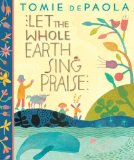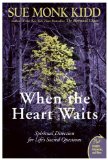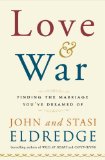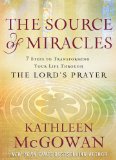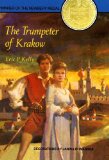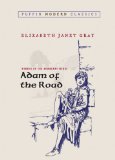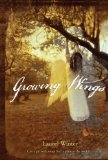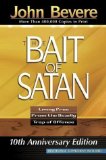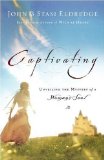Review of Universalism, the Prevailing Doctrine of the Christian Church During Its First Five Hundred Years: With Authorities and Extracts, by John Wesley Hanson
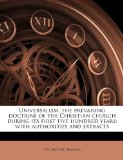 Universalism, the Prevailing Doctrine of the Christian Church During Its First Five Hundred Years: With Authorities and Extracts
Universalism, the Prevailing Doctrine of the Christian Church During Its First Five Hundred Years: With Authorities and Extracts
by John Wesley Hanson
Universalist Publishing House, Boston and Chicago, 1899. 321 pages.
Starred Review
The title of this book well sums up what it’s about. This is not a book for the general reader. This is a reprint of a book in the public domain, originally published in 1899. The language is dense and old-fashioned.
When it first dawned on me that George MacDonald was teaching that all will (eventually) be saved, I was surprised. He clearly believed this is what the Bible teaches. But how could he think that? Doesn’t the Bible teach that the wicked will perish and burn eternally? Isn’t that what all good Christians think?
So, I reread the Bible and saw how much was open to interpretation. At the time, I thought the case for either view was about equal. (Since then, I think it’s actually stronger for universalism.) I chose to believe the view that I thought had a higher view of God. If it bothers me that God would send people to burn in hell forever and ever, should I believe in that God? It also meant that I can’t write off other people nearly as easily as before.
But I still thought I was bucking tradition believing this. So I was amazed and delighted to read this book, showing with many examples that the early church believed all will be saved. That the “mainstream” view was not at all mainstream until about 500 years after Christ. In fact, when the church was dominated by those who spoke Greek, it was also dominated by Universalism.
Now, this book is dense, as I said. It’s only for people like me, whose biggest obstacle in believing in Universalism is thinking that it’s not Biblical, and is against the mainstream view of the church. This book shows that not only did a deeply spiritual man like George MacDonald think that Universalism is Biblical, so did Christ’s first followers. It’s for people who deeply believe in the authority of Scripture.
I had to laugh when I read this paragraph in the Foreword:
“The first form of his manuscript contained a thousand copious notes, with citations of original Greek and Latin, but such an array was thought by judicious friends too formidable to attract the average reader, as well as too voluminous, and he has therefore retained only a fraction of the notes he had prepared.”
I laughed because the book is still formidable indeed, and not at all for the average reader. But there’s excellent information here, and Christians who wonder about the Biblical basis for Universalism will have their eyes opened.
Also in the Foreword, the author states:
“The purpose of this book is to present some of the evidence of the prevalence in the early centuries of the Christian church, of the doctrine of the final holiness of all mankind. The author has endeavored to give the language of the early Christians, rather than to paraphrase their words, or state their sentiments in his own language. He has also somewhat copiously quoted the statements of modern scholars, historians and critics, of all shades of opinion, instead of condensing them with his own pen.”
This is why the book is formidable, but it’s also why it is most convincing and thorough.
The author’s purpose is not to present the Scriptural evidence for Universalism. “Neither is it the purpose of the author of this book to write a history of the doctrine; but his sole object is to show that those who obtained their religion almost directly from the lips of its author, understood it to teach the doctrine of universal salvation.”
When my pastor talked about Love Wins, by Rob Bell, which teaches Universalism, he said that he did not agree with Rob Bell’s conclusion. But I loved that he said, “Shouldn’t we want to believe it?” In many ways this book gives me permission to believe that all will be saved. After all, if the early church fathers believed it, how can I possibly contend that it’s not Biblical?
The book goes into great, convincing, and, yes, tedious detail. I’ll present a few of the points.
First, he looks at the oldest creeds. There’s simply nothing about everlasting punishment.
“Thus the credal declarations of the Christian church for almost four hundred years are entirely void of the lurid doctrine with which they afterwards blazed for more than a thousand years. The early creeds contain no hint of it, and no whisper of condemnation of the doctrine of universal restoration as taught by Clement, Origen, the Gregories, Basil the Great, and multitudes besides.”
He does look at the teachings of the church fathers listed above in great detail. I’ll list some paragraphs that give some insight into his arguments:
“The talismanic word of the Alexandrian fathers, as of the New Testament, was Father. This word, as now, unlocked all mysteries, solved all problems, and explained all the enigmas of time and eternity. Holding God as Father, punishment was held to be remedial, and therefore restorative, and final recovery from sin universal.”
“The Greek Fathers derived their Universalism directly and soley from the Greek Scriptures. Nothing to suggest the doctrine existed in Greek or Latin literature, mythology, or theology; all current thought on matters of eschatology was utterly opposed to any such view of human destiny. And, furthermore, the unutterable wickedness, degradation and woe that filled the world would have inclined the early Christians to the most pessimistic view of the future consistent with the teachings of the religion they had espoused. To know that, in those dreadful times, they derived the divine optimism of universal deliverance from sin and sorrow from the teachings of Christ and his apostles, should predispose every modern to agree with them.”
I thought this part about the Greek words used was fascinating:
“When our Lord spoke, the doctrine of unending torment was believed by many of those who listened to his words, and they stated it in terms and employed others, entirely different, in describing the duration of punishment, from the terms afterward used by those who taught universal salvation and annihilation, and so gave to the terms in question the sense of unlimited duration.
“For example, the Pharisees, according to Josephus, regarded the penalty of sin as torment without end, and they stated the doctrine in unambiguous terms. The called it eirgmos aidios (eternal imprisonment) and timorion adialeipton (endless torment), while our Lord called the punishment of sin aionion kolasin (age-long chastisement).
“The language of Josephus is used by the profane Greeks, but is never found in the New Testament connected with punishment. Josephus, writing in Greek to Jews, frequently employs the word that our Lord used to define the duration of punishment (aionios), but he applies it to things that had ended or that will end. Can it be doubted that our Lord placed his ban on the doctrine that the Jews had derived from the heathen by never using their terms describing it, and that he taught a limited punishment by employing words to define it that only meant limited duration in contemporaneous literature?”
The author goes on to give many examples of the different terms used in Greek at the time of Christ.
“Had our Lord intended to inculcate the doctrine of the Pharisees, he would have used the terms by which they described it. But his word defining the duration of punishment was aionion, while their words are aidion, adialeipton and athanaton. Instead of saying with Philo and Josephus, thanaton athanaton, deathless or immortal death; eirgmon aidion, eternal imprisonment; aidion timorion, eternal torment; and thanaton ateleuteton, interminable death, he used aionion kolasin, an adjective in universal use for limited duration, and a noun denoting suffering issuing in amendment. The word by which our Lord describes punishment is the word kolasin, which is thus defined: “Chastisement, punishment.” “The trimming of the luxuriant branches of a tree or vine to improve it and make it fruitful.” “The act of clipping or pruning — restriction, restraint, reproof, check, chastisement.” “The kind of punishment which tends to the improvement of the criminal is what the Greek philosophers called kolasis or chastisement.”
This close look at the Greek background makes it all the more interesting that the teaching of Universalism prevailed while the church fathers were primarily Greek-speaking.
Some other interesting points:
“Not a writer among those who describe the heresies of the first three hundred years intimates that Universalism was then a heresy, though it was believed by many, if not by a majority, and certainly by the greatest of the fathers.
“Not a single creed for five hundred years expresses any idea contrary to universal restoration, or in favor of endless punishment.”
“While the councils that assembled in various parts of Christendom, anathematized every kind of doctrine they supposed to be heretical, no ecumenical council, for more than five hundred years, condemned Universalism, though it had been advocated in every century by the principal scholars and most revered saints.”
“The first defense of Christianity against Infidelity (Origen against Celsus) puts the defense on Universalistic grounds. Celsus charged the Christians’ God with cruelty, because he punished with fire. Origen replied that God’s fire is curative; that he is a “Consuming Fire,” because he consumes sin and not the sinner.”
Believe me, the author goes into excruciating detail to back up these, and many other points. He looks at a multitude of ancient writings and commentaries on the writings.
So, reader, you will know if this book would be interesting to you. It was definitely interesting to me, though I had to take it slowly! But I feel much much less out of the mainstream than I did before. To me, it definitely establishes that a Christian can believe the Bible and still believe in Universalism. After all, is there anyone who would say those early church fathers were not Christians? And if those native Greek speakers believed the Bible taught universalism, who are we to say different?
Find this review on Sonderbooks at: www.sonderbooks.com/Nonfiction/universalism.html
Disclosure: I am an Amazon Affiliate, and will earn a small percentage if you order a book on Amazon after clicking through from my site.
Source: This review is based on a book I purchased via Amazon.com.
